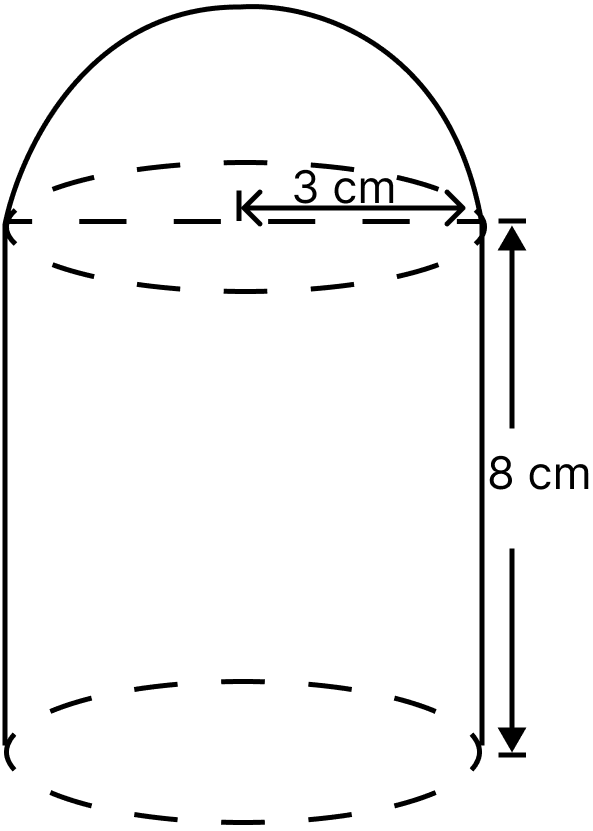Mathematics
The adjoining figure shows a model of a solid consisting of a cylinder surmounted by a hemisphere at one end. If the model is drawn to a scale of 1 : 200, find
(i) the total surface area of the solid in π m2.
(ii) the volume of the solid in π litres.

Mensuration
42 Likes
Answer
(i) In the given figure,
Height of cylindrical portion (H) = 8 cm.
Radius (r) = 3 cm.
Scale = 1 : 200
∴ k = 200.
Total surface area (S) = Surface area of hemisphere + Curved surface area of cylinder = 2πr2 + 2πrH
∴ Surface area of solid = 66π × k2 = 66π × (200)2
= 66π × 40000 cm2
= m2
= 264π m2.
Hence, the surface area of solid = 264π m2.
(ii) Volume (V) = Volume of hemisphere + Volume of cylinder =
Putting values we get,
∴ Volume of solid = 90π × k3 = 90π × (200)3
= 90π × 8000000 = 72000000π cm3
=
= 720π m3.
1 m3 = 1000 litres.
∴ Volume of solid = 720π × 1000 = 720000π litres.
Hence, the volume of solid = 720000π litres.
Answered By
21 Likes
Related Questions
A rocket is in the form of a right circular cylinder closed at the lower end and surmounted by a cone with the same radius as that of the cylinder. The diameter and the height of the cylinder are 6 cm and 12 cm respectively. If the slant height of the conical portion is 5 cm, find the total surface area and the volume of the rocket. (Use π = 3.14).
The adjoining figure represents a solid consisting of a right circular cylinder with a hemisphere at one end and a cone at the other. Their common radius is 7 cm. The height of the cylinder and the cone are each of 4 cm. Find the volume of the solid.

A toy is in the shape of a right circular cylinder with a hemisphere on one end and a cone on the other. The height and radius of the cylindrical part are 13 cm and 5 cm respectively. The radii of the hemispherical and conical parts are the same as that of the cylindrical part. Calculate the surface area of the toy if the height of the conical part is 12 cm.
A solid is in the form of a right circular cylinder with a hemisphere at one end and a cone at the other end. Their common diameter is 3.5 cm and the height of the cylindrical and conical portions are 10 cm and 6 cm respectively. Find the volume of the solid. (Take π = 3.14)